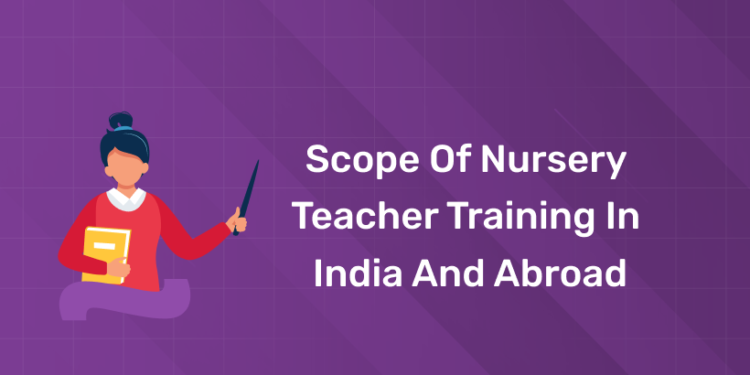Table of Contents
If you walk into any good preschool today – whether it’s in Kochi, Bangalore, Dubai or Singapore – one thing stands out immediately:
A calm, smiling nursery teacher managing 15–20 energetic three-year-olds as if it’s the easiest thing in the world.
Behind that calm face is training, practice and a huge amount of demand.
With India’s push on Early Childhood Care and Education (ECCE) under NEP 2020 and the global rise of play-based and Montessori schooling, Nursery Teacher Training (NTT) has quietly become one of the most promising career paths for those who love working with young children.
This blog is for:
- Normal readers who are curious about the career
- Aspiring Montessori and nursery teachers
- Parents who want to understand what kind of training their child’s teacher should have
We’ll cover:
- What exactly does Nursery Teacher Training / ECCE / Montessori TTC mean
- The scope and job opportunities in India
- The demand and pathways abroad (Gulf countries, Europe, SE Asia, etc.)
- Typical salary ranges & growth
- Who this career is ideal for
- And how Entri’s Montessori TTC course fits into this bigger picture
Register for the Entri Elevate Montessori Teacher Training Program! Click here to join!
What Is Nursery Teacher Training (NTT) – and How Is It Different from Montessori TTC?
In India, you’ll see a few common terms:
- NTT – Nursery Teacher Training
- ECCE – Early Childhood Care and Education
- Pre-Primary Teacher Training / PPTT
- Montessori Teacher Training / Montessori TTC
All of them are focused on children roughly in the 2–6 age group, but with slightly different angles:
1. Nursery Teacher Training (NTT)
- Usually a 1-year diploma (sometimes 2 years or in two levels)
- Focuses on child psychology, play-based teaching, lesson planning, rhymes, stories, classroom management
- Many institutes accept students after 10+2 (Class 12); some even after Class 10 for basic diploma levels
- Prepares you to work as a nursery / pre-primary teacher in playschools, preschools, LKG/UKG etc.
2. ECCE Diplomas
- ECCE = Early Childhood Care and Education
- Curriculum usually includes health, nutrition, child development, classroom environments and inclusion
- NEP 2020 and NCERT documents highlight ECCE as a foundational stage (3–6 years), which is now formally part of India’s school structure.
- IGNOU and several state governments now run ECCE diplomas (like Odisha’s DECE in Odia) to upskill Anganwadi and pre-primary workers.
3. Montessori Teacher Training / Montessori TTC
- Based on Dr. Maria Montessori’s philosophy – child-led, hands-on, structured freedom
- Focuses on prepared environment, didactic materials, practical life, sensorial materials, language and math for 3–6 year olds
- Highly valued by international schools, premium preschools and global Montessori schools
- Montessori TTCs (like Entri’s) are often chosen by those who want to:
- Work in Montessori schools in India
- Target jobs abroad in the Gulf, UK, Europe, Singapore, etc. where Montessori is well-known
- Work in Montessori schools in India
In simple terms:
NTT/ECCE build your base as a nursery teacher.
Montessori TTC gives you a specialised, globally recognisable early-years skillset.
Why the Scope of Nursery Teacher Training Is Growing in India
1: What is the primary focus of the first plane of development in the Montessori method?
The scope isn’t growing “by chance”. There are strong policy, economic and social reasons behind it.
1. NEP 2020 Brought Preschool into the Formal System
The National Education Policy 2020 officially integrated ECCE (3–6 years) into the school structure as part of a 5+3+3+4 model. It explicitly says:
- ECCE is a foundational pillar
- Over 85% of a child’s brain development happens before age 6
- There will be a national ECCE curriculum framework and trained teachers are key
This means:
- More Balvatika / pre-primary classes in government schools
- More focus on trained nursery educators rather than just “didis”
Recent data shows that by 2024, about 80–85% of 3- and 4-year-olds in rural India are enrolled in some form of early childhood programme (Anganwadis, Balvatikas, etc.).
States like Uttar Pradesh and Jharkhand are upgrading thousands of Anganwadis into playschool-style ECCE centres, with trained early childhood educators.
All of this translates to one thing: demand for trained nursery and ECCE teachers is structurally built into India’s education policy for the next decade.
2. The Preschool & Childcare Market Is Booming
Private preschools and childcare chains have exploded across cities and Tier-2/3 towns.
- India’s preschool/childcare market touched around USD 4.6 billion in 2024 and is projected to grow to USD 11 billion by 2033, with a CAGR of about 9.5%.
- Another report estimates the Indian preschool/childcare market at roughly ₹25,000 crore in 2023, with strong growth driven by urbanisation and working parents.
More preschools = more:
- Nursery teachers
- Centre heads
- Curriculum planners
- Montessori guides
Even fee debates (like the viral post about a Hyderabad nursery charging ₹21,000 per month) highlight how early education has become a serious, high-value sector, not an afterthought.
Where there’s this much money and attention, there will be steady demand for trained people.
Get Certified & Start Your Montessori Career
Montessori Teacher Training Course by Entri App: Gain expert skills, earn certification, and kickstart your teaching career.
Join Now!Career Options in India After Nursery Teacher Training / Montessori TTC
After completing NTT / ECCE / Montessori TTC, here’s where you can work in India:
1. Nursery / Pre-Primary Teacher
The most direct role: teaching children aged 3–6 years in:
- Standalone preschools
- K-12 schools with attached nursery sections
- Franchise chains and premium early-years brands
What you actually do:
- Plan daily activities (circle time, rhymes, art, story, sensorial work)
- Teach basic pre-literacy and numeracy through play
- Observe and support children’s emotional and social development
- Interact with parents and share progress
Salary range (India):
- The average salary for preschool teachers across India is around ₹16,000 per month, based on Indeed’s aggregated data.
- In Kerala, nursery teachers typically earn ₹10,000–₹20,000 per month, depending on school and experience.
- Premium urban schools and international schools can pay more, especially with experience and additional degrees.
While the starting salary isn’t sky-high, growth over time + additional qualifications can move you to coordinator, academic head, or early-years specialist roles.
2. Montessori Teacher in Montessori or Hybrid Schools
If you complement NTT with Montessori TTC, you can:
- Work in pure Montessori schools
- Join hybrid preschools that blend Montessori with other methods
- Take roles like Montessori guide, assistant teacher, or lead teacher
Schools increasingly mention “Montessori training preferred” in job posts, especially in metros and premium preschools, because parents now actively search for “Montessori school near me”.
3. ECCE Educator in Government / NGO Setups
With NEP 2020 and schemes like Saksham Anganwadi & Poshan 2.0, many states are upgrading Anganwadi centres into pre-school style hubs and providing ECCE training.
A trained person can find opportunities:
- As an ECCE resource person / trainer for Anganwadi workers
- In NGOs working on early childhood education and community preschools
- As a Balvatika teacher (with additional qualifications as defined by state rules)
4. Centre Head / Academic Coordinator
With experience and sometimes a degree (B.Ed / MA Education / Child Development), nursery teachers can move into:
- Centre head / branch head
- Pre-primary coordinator for a K-12 school
- Academic supervisor overseeing lesson plans and teacher training
Private school teacher salary data suggests that as teachers move into mid-career roles, salaries can reach ₹35,000–₹50,000 per month, and senior leadership can go even higher.
5. Start Your Own Preschool or Activity Centre
Many NTT and Montessori-trained educators eventually:
- Start a small home-based preschool or playgroup
- Open a Montessori activity centre, after-school centre, or enrichment studio
- Partner with a preschool franchise brand
The booming preschool/childcare market and rising urban incomes make early-years entrepreneurship a realistic path, especially for women looking for flexible, meaningful businesses.
Scope of Nursery Teacher Training Abroad
If you dream of teaching in Dubai, Abu Dhabi, Qatar, Singapore, UK, Europe or beyond, nursery teacher training plus Montessori TTC can be a strong foundation.
1. Global Early Childhood Education Market Is Expanding
The global early childhood education market was worth around USD 392 billion in 2024 and is projected to reach about USD 1.4 trillion by 2034, with a CAGR of roughly 12.4%.
This massive growth is driven by:
- More dual-income families
- Governments focusing on early learning
- International schools spreading across Asia, Middle East and Africa
More schools + more early-years programmes = more demand for trained nursery and Montessori teachers.
2. Demand for Montessori and Nursery Teachers in the Gulf & Overseas
A quick look at job portals shows:
- Dozens of Montessori / nursery teacher vacancies in UAE, Qatar, Oman and Bahrain at any given time
- Active hiring for preschool / kindergarten teachers in Singapore and SE Asia, often preferring Montessori or early-childhood diplomas.
An Entri blog on Montessori teacher jobs abroad notes roughly 30% higher demand for Montessori educators in international schools, especially across the Gulf and other expatriate hubs.
Typical employers abroad include:
- CBSE / Indian curriculum schools with KG sections
- British / IB / American curriculum international schools
- Standalone Montessori and Reggio-inspired early-years centres
Important:
Every country has its own visa and qualification rules. NTT / Montessori TTC from India is usually a base qualification, and you may also need:
- A Bachelor’s degree (often mandatory)
- Sometimes B.Ed or equivalent
- English language tests (IELTS etc.) depending on the country
- Local license or registration in some regions
But a strong foundation in early childhood and Montessori methods makes you competitive for these roles, especially when combined with good English and experience.
3. Lifestyle & Growth Abroad
While salaries vary widely, many nursery teachers abroad:
- Earn higher than Indian salaries, especially in Gulf countries
- Receive benefits like accommodation allowance, medical insurance, annual ticket home (depends on school)
- Get exposure to multicultural classrooms and international teaching standards
For many, working abroad for a few years becomes a career and financial accelerator, before returning to India as senior educators, trainers or school owners.
Who Is Nursery Teacher Training Ideal For?
This path is a good fit if you:
- Genuinely enjoy young children, their questions, mess, noise and curiosity
- Prefer interactive, hands-on work over corporate desk jobs
- Want a career that can be flexible after marriage/children, including part-time roles
- Are drawn to Montessori, child psychology, parenting and education topics
- Are okay with initially modest pay but high emotional reward and long-term growth
It’s especially attractive for:
- Graduates waiting for other exams/jobs who want a solid backup career
- Homemakers planning to re-enter the workforce
- Parents who discovered a love for early-years learning while raising their own kids
- Young graduates who want a purpose-driven job rather than just any job
Get Certified & Start Your Montessori Career
Montessori Teacher Training Course by Entri App: Gain expert skills, earn certification, and kickstart your teaching career.
Join Now!Skills That Make a Nursery / Montessori Teacher Stand Out
Certificates matter, but skills and mindset are what principals and school owners really look for:
- Warm, patient communication with children and parents
- Ability to observe quietly and adjust activities to each child
- Basic understanding of child psychology and developmental milestones
- Classroom management: keeping 15–20 children engaged without shouting
- English plus at least one local language (very helpful in Indian schools)
- Comfort with Montessori materials and practical-life activities
- Willingness to learn continuously (NEP, new curricula, inclusive education, etc.)
Well-designed courses – like Entri’s Montessori TTC – try to build exactly these.
How Entri’s Montessori TTC Course Fits into This Scope
You asked specifically for Entri to be integrated, so let’s look at where it fits in the big picture.
From Entri’s own content on Montessori careers:
- Demand for Montessori teachers – especially from India/Kerala – is rising across Gulf countries and international schools.
- Entri’s Montessori Course is positioned to help educators tap into these India + abroad opportunities, with a structured, job-oriented curriculum and certification (including NSDC-aligned credentialing).
A well-structured Montessori TTC like Entri’s typically aims to:
- Cover Montessori philosophy and practical methods for ages 3–6
- Train you in setting up the classroom, using materials, observing children
- Build lesson planning, record-keeping and parent communication skills
- Provide career guidance for both Indian and international schools
- Often connect you to placement assistance, interview prep, and community support
For someone who has:
- Completed or plans to complete NTT/ECCE
- Or is starting directly with Montessori TTC
…Entri’s course can become the bridge between “just a certificate” and being classroom-ready and job-ready – in India and abroad.
Key Takeaways – Scope of Nursery Teacher Training in India & Abroad
Let’s wrap it up in a quick checklist.
- High, long-term demand:
- NEP 2020 and ECCE integration mean nursery and pre-primary teachers will remain in demand across government and private systems.
- NEP 2020 and ECCE integration mean nursery and pre-primary teachers will remain in demand across government and private systems.
- Growing market:
- India’s preschool/childcare market is projected to more than double by 2033, creating thousands of jobs in teaching, coordination and school leadership.
- India’s preschool/childcare market is projected to more than double by 2033, creating thousands of jobs in teaching, coordination and school leadership.
- Global opportunities:
- The global early childhood education market is booming, with consistent demand for nursery and Montessori teachers in the Gulf, SE Asia, Europe and beyond.
- Career paths are diverse:
- You can work as a teacher, coordinator, trainer, curriculum designer, franchise partner or preschool owner.
- You can work as a teacher, coordinator, trainer, curriculum designer, franchise partner or preschool owner.
- Salaries start modest but grow:
- Average preschool teacher pay in India hovers around ₹12,000–₹18,000 per month, with higher pay in premium schools and substantial jumps as you move into leadership roles.
- Montessori training adds edge:
- Montessori TTC enhances your employability in premium Indian schools and makes your profile stronger for overseas roles.
- Montessori TTC enhances your employability in premium Indian schools and makes your profile stronger for overseas roles.
- Entri’s Montessori TTC fits well into this landscape:
- It’s tailored for Indian aspirants targeting both local and international early-years careers, combining flexible learning with job-oriented content.
- Ideal for people who want meaningful, child-centred work:
- If you love working with little children, enjoy creative teaching and want a career that can move with your life stages, nursery teacher training is a strong choice.
- If you love working with little children, enjoy creative teaching and want a career that can move with your life stages, nursery teacher training is a strong choice.
Final Word: A Quietly Powerful Career
Not everyone wants to become a doctor, engineer, or high-pressure corporate professional.
Some people:
- Want work that feels meaningful every single day
- Prefer laughter, crayons, and storybooks over spreadsheets
- Find joy in seeing a three-year-old write their first letter or share a toy for the first time
For those people, Nursery Teacher Training + Montessori TTC is not a “backup option”. It’s a core, future-proof career with real scope in India and abroad.
Get Certified & Start Your Montessori Career
Montessori Teacher Training Course by Entri App: Gain expert skills, earn certification, and kickstart your teaching career.
Join Now!Frequently Asked Questions
What is Nursery Teacher Training (NTT)?
NTT is a professional teacher training course that prepares individuals to teach children aged 2–5 through play-based and activity-centered learning.
Is Nursery Teacher Training a good career option in India?
Yes. With rising demand for preschools, Montessori centres, and early childhood educators, NTT offers stable job opportunities and long-term career growth.
Can I work abroad after completing NTT in India?
Absolutely. Countries like the UAE, UK, Canada, and Singapore hire trained preschool teachers, especially those with Montessori-based training.
What skills do NTT-trained teachers need?
Key skills include child psychology, storytelling, lesson planning, communication, classroom management, and activity-based teaching.
What is the salary of NTT-qualified teachers in India?
Freshers typically earn ₹15,000–₹28,000/month, depending on the city and institution. With experience, salaries can increase significantly.
Can housewives or beginners join an NTT course?
Yes, NTT is ideal for beginners, housewives, and career switchers. It requires no prior teaching experience.
What job roles can I get after completing NTT?
You can work as a Nursery Teacher, Montessori Teacher, Preschool Facilitator, Centre Coordinator, Childcare Educator, or Early Childhood Assistant.
What is the difference between NTT and Montessori Training?
NTT covers general early childhood teaching, while Montessori focuses on the Montessori philosophy, materials, and child-led learning.















